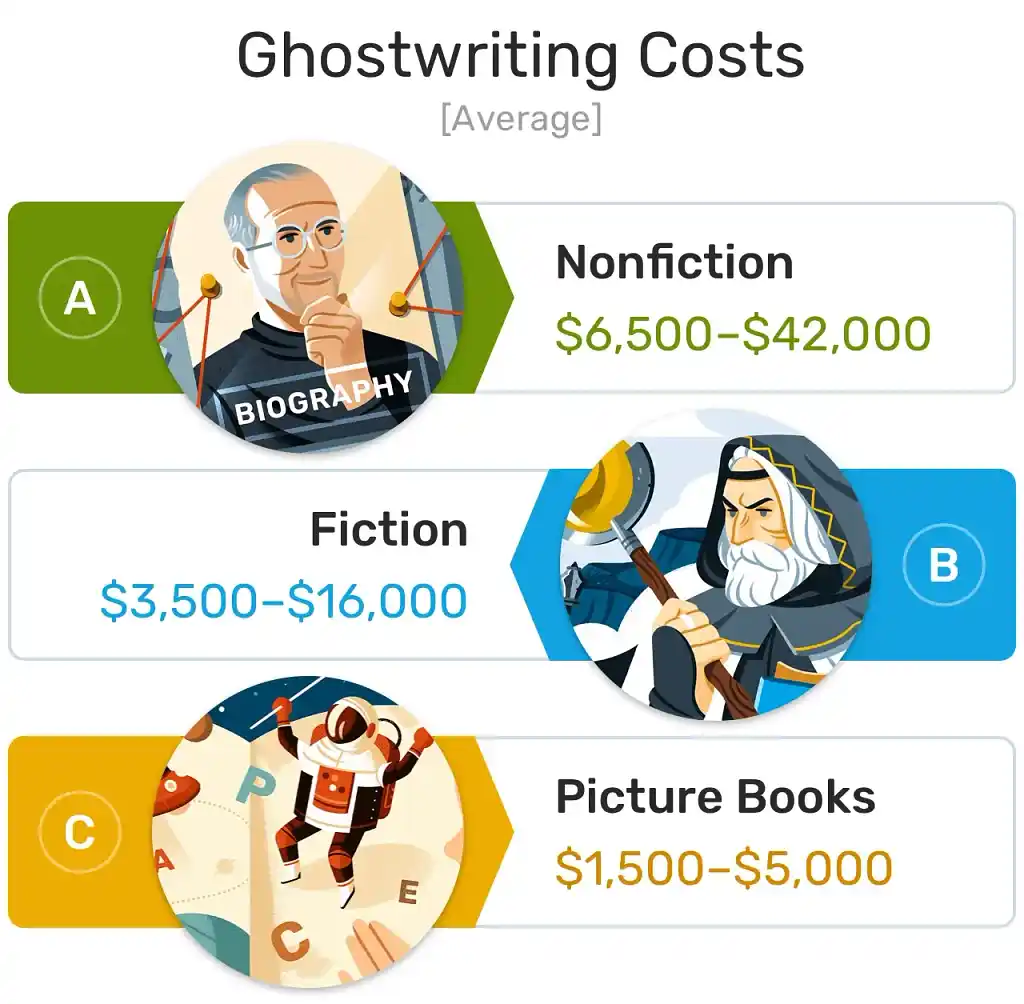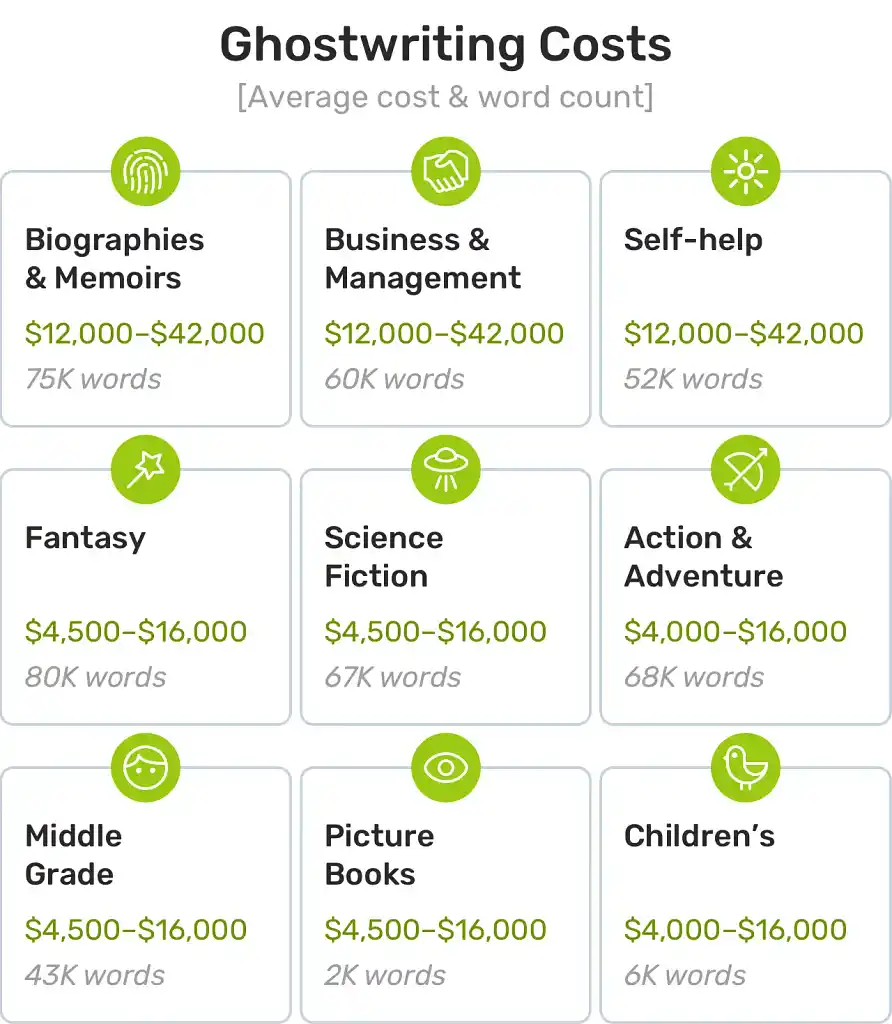Blog •
Last updated on Jul 08, 2024
How Much Do Ghostwriters Make: The Ultimate Breakdown
This article was written with insights from Reedsy Marketplace, as well as professional ghostwriters Alex Foster and Alice Sullivan.
“How much do ghostwriters make?” That’s a question both aspiring ghosts and those with some experience should ask themselves. The short answer is that ghostwriters can make anywhere from $42,000+ for a book and to $2,000 for shorter-form content. Of course, the longer answer is that it will depend on the type and genre of content, as well as the experience of the ghostwriter.
Because of its shadowy nature, it can be hard to find out what other ghostwriters make and how to cost your own projects. As a result, ghostwriting can sometimes be grossly undercharged, particularly in the publishing industry. To help you set reasonable rates that match your niche and expertise and build up your income, here’s our breakdown of ghostwriting fees, based on thousands of projects on Reedsy in the last 24 months.
How much should you charge as a ghostwriter?
Every ghostwriting project is different — one might involve writing an article, and another can be crafting a whole book. The scopes of these tasks are very different, and the rates will vary accordingly. Ultimately, how much you charge should reflect how much research and writing you have to do, how much costs you will incur along the way, and the value of the service you produce. In other words, there isn’t a one-size-fits-all rate that works for every ghostwriter under the sun.
That said, this isn’t what clients want to hear when they ask about your service. They expect a quote that helps them compare freelancers and decide who to hire. On top of that, you yourself may be wondering if you’re under or overcharging. In either case, you might find use in knowing an average range of ghostwriting rates in different genres and industries. So, we’ve put together some estimates here.
Generally, depending on the work you do, you can charge:
-
by the word
-
by the hour
-
by the project
Based on Reedsy data, ghostwriting rates for book writing can range from roughly $0.10 to $2.50 per word, $35 to $140 per hour, or $1,500 to $42,000 per project. Let’s take a closer look at the breakdown.

❗ Note: The rates below are estimates — you should consider your own needs and skills, and negotiate with your client before setting a fee.
Per word
Range: $0.10 to $4 per word
Often applies to: articles and web content, manuscript rewrites, book descriptions
Charging per word is the most obvious sort of payment, since you get paid according to how much you write. However, it doesn’t account for resources spent on researching and outlining your writing, and so it’s more suitable for shorter projects. Ghostwriter Alex Foster, experienced in both fiction and nonfiction writing, shares that he charges per word only if the project is below the typical word count range for a book — in other words, below 50,000.
However, if you’re curious about what this would look like when applied to book writing, here is a breakdown of the average cost range for book ghostwriting by genre and word count:
|
Genre |
Cost range |
Average Word count |
Per word |
|
Biographies & Memoirs |
$12,000 to $42,000 |
75K |
$0.16 to $0.56 |
|
Business & Management |
$8,000 to $32,000 |
60K |
$0.13 to $0.53 |
|
Self-Help |
$6,500 to $26,000 |
52K |
$0.13 to $0.50 |
|
Fantasy |
$4,500 to $16,000 |
80K |
$0.06 to $0.20 |
|
Science Fiction |
$4,500 to $16,000 |
67K |
$0.07 to $0.24 |
|
Action & Adventure |
$4,000 to $16,000 |
68K |
$0.06 to $0.24 |
|
Middle Grade |
$3,500 to $15,000 |
43K |
$0.08 to $0.36 |
|
Picture Books |
$1,500 to $5,000 |
2K |
$0.75 to $2.50 |
For book-related projects, Reedsy's ghostwriters charge an average of 30 cents per word. The most popular genre of ghostwriting is biography and memoir, for which ghostwriters charge $0.35 per word on average. The most lucrative genre is general nonfiction (which includes subgenres such as business, religion and spirituality, health and well-being, etc.), for which Reedsy ghostwriters charge $0.52 per word on average.
If you work with marketing content or other types of short-form content, the rate is usually a little higher. But, to reiterate, it might not be in your interest to charge per word if you’re writing long-form content such as books. So let’s see if you should charge per hour instead.

JOIN REEDSY
Find exciting new projects
We connect publishing professionals with our community of 1,500,000 authors.
Per hour
Range: $35-$140 per hour
Often applies to: consultation, reviewing
There are very few occasions when you would charge per hour for ghostwriting projects. In professional ghostwriter Alice Sullivan’s experience, most editorial jobs in traditional publishing are paid per hour, but freelance ghostwriters are almost always paid per project. In indie publishing, hourly rates are also uncommon for ghostwriting services. Clients are averse to collaborations charged this way because they’re wary of inefficiency, and ghostwriters themselves feel like they’re punished for efficiency. It’s a lose-lose situation which is not really conducive to a happy partnership.
So, in what situations could you still consider charging by the hour?
- If you’re working on a critique or review of a draft.
- If you’re acting as a publishing or marketing consultant, advising clients on voice and content.
These services may warrant the hourly wage, although you’ll notice that they don’t involve as much writing. After all, writing is a creative endeavor that can be hard to measure by the hour; some hours are spent pondering and imagining, while others are spent writing and rewriting. That’s why it can be easier to charge per project.
Flat fee
Range: $2,000 to $70,000+ per project
Often applies to: manuscript writing, book proposal writing, query letter writing, etc.
If you’re ghostwriting a whole book, you might have a rough word count in mind, but it’s best to settle on a flat fee that would cover the research, the writing, and a couple of rounds of manuscript revision. Alice Sullivan says: “I aim for a six to seven months timeline, but [projects] can also stretch out to over a year.” If you charge per project, you can be paid a fixed rate either in one go or in installments throughout the collaboration. We recommend the latter, but either way, knowing how much is coming into your account and when allows you to plan for your sustenance.

So, how do you know how much to charge for your project? Again, it is a combination of what type of content you’re writing, the scope of the project and time required to complete it, the genre, and your experience as a ghost. Let’s refer back to our averages from earlier:

Beginner ghostwriters can expect to make anything between $2,000 and $9,000 per book. If you have a fair amount of experience under your belt, the average rises to around $30,000 to $60,000 per book. And if you've got several bestsellers under your belt, or if you're represented by agents, you’ll be looking at six-figure fees. For book proposals that help clients land book deals, the typical price starts at about $5,000.
So, on a more practical level, how do you actually land on your final quote and present it to clients?
How should you write a quote for book projects?
Book writing services are almost always charged per project. But bear in mind that the ghostwriter may also be expected to help with other parts of the project. As such, writing a good ghostwriting quote entails taking the whole publishing process into account. From writing to editing to submitting to publishers, here are important things to keep in mind when creating a ghostwriting quote for a book.
Consider basic factors
Alice explains that when coming up with her quote, she considers “the word count, timeline, whether there's any existing material (and if it's even usable), and whether I'll need to do any research for the project.”

As a ghostwriter, research also includes the time it might take to get to know your client well enough to capture their voice and story. This work starts already before you send them your bid, as you work out the scope of the project and your client’s vision. It also includes the time it might take to interview them if you’re writing a memoir. Because ghostwriting projects often stretch over several months, these initial stages are extra important, as you want to make sure that you both align and won’t bump into any issues later down the line. So, ideally, when you send your quote for a project, you should consider and allow plenty of time for this stage, not just the writing stage.
Another thing to consider is how many (if any) rewrites you will include in your initial price.
Clarify your responsibility to revise
With seven years of experience, Alex Foster has worked with a range of clients, including those who would “push you to do half a dozen additional revision phases.” To protect yourself, your time, and your bottom line, “you need contractual ways to mitigate this” and should “always try to be as specific as possible in [your] contracts.” Any revision beyond what you first agreed upon should be charged extra, perhaps with an hourly rate on an ad hoc basis.
An additional tip from Alex is to set payments according to project deliverables (e.g. a book outline, two sample chapters), “so if for any reason [you and your client] decide to stop working together, it's pretty simple to determine what the refund amount would be.”
For more advice from Alex and other pro ghosts on Reedsy, check out our post with 21 ghostwriting tips to improve your craft.
Offer relevant services
If you have experience in the publishing industry, you’ll know that writing the manuscript is just one part of the process of getting a book out into the world. An author going down the traditional route would likely have to:
- Write a query letter to be sent to literary agents, if they’re writing a fiction book;
- Prepare a book proposal even before completing a manuscript, if their project is nonfiction.
And while indie authors won’t have to query or submit their work, they might want help with writing marketing materials, such as:
- A book description for the book's Amazon page;
- Content for their personal website;
- Newsletters to their readers.
These are all services you can offer in addition to writing the manuscript. As the writer, you're likely the best person to introduce the book to publishers and readers.
These extra tasks can be grouped into a packaged deal with a higher quote. If you do decide to include them in your freelance offer, remember to break things down clearly. Let clients know exactly what they’re paying for, and give them a chance to decide whether they want the full deal.

FREE RESOURCE
Ghostwriting Proposal Template
Lay out your rates, deliverables, and timeline with a professional template.
Should you agree to get paid in royalties?
The quick answer is no. You should not agree to a ghostwriting project in exchange for a cut of the royalties. According to Alice Sullivan, this might be a viable option if you’re working via an agent. The agent can ensure you get a fair percentage, and that payments are made on time. But when you’re dealing with indie authors, income from royalties won’t be as stable.
Negotiating for a fair division between author and ghost won’t be easy, and you’ll have to be ready to chase authors for payment. Besides, you can never be sure if the book will sell, if you’ll get any royalties at all, or how much you’ll get paid, which introduces uncertainty into your business that is rarely worth the risk.
You can still accept royalty payments as a bonus to the agreed payment but don’t expect a lot of authors to offer that. That is, unless you’re…
Getting credit as a ghostwriter
Sometimes, the author agrees to name the ghost as a co-author, meaning the ghost gets their name on the cover! How much do ghostwriters make in this scenario? Ghosts can get from 8% to 50% of royalties, depending on how negotiations with the author go.

Most of the time, though, authors hire ghostwriters precisely because they need a ghost, a.k.a. someone readers won’t see. That doesn’t mean that they will ignore your efforts altogether. Some ways authors use to accredit ghostwriters are:
- Include the ghostwriter’s name on the copyright page underneath the author’s name;
- Thank the ghostwriter in the introduction/foreword or acknowledgments in the back;
- Writing a testimonial that ghosts can show future clients.
Even if an author is considerate and acknowledges you in their book, graciousness shouldn’t be used as a point of negotiation. In other words, if acknowledgment is their way to compensate you while only paying you in royalties, you shouldn’t accept it. Writing a book is hard work, and you should get paid what you’re worth!
With that final note, you’ve now got a solid grasp of how much ghostwriters make, and how they get paid. Hopefully, this’ll help you determine your own rates so that you can go forth and find more ghostwriting jobs and projects!
For information about how to showcase your experience, get more clients, or notifications about free webinars, check out our blog and follow us on LinkedIn.

